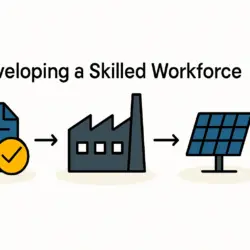The African Development Bank (AfDB) is bolstering Niger’s efforts to transform its energy landscape with a significant investment of $144.7 million. This funding is a cornerstone of Niger’s broader energy expansion plan, which aims to increase the country’s solar capacity and overall energy production significantly by 2030. The goal is to raise national energy capacity from 220 MW to a more robust 600 MW within the next six years, a critical step toward energy security and economic growth.
Major Solar Power Projects Underway for Niger solar expansion
AfDB President Akinwumi Adesina highlighted several key projects that form the backbone of this ambitious Niger solar expansion. A central component is the plan to develop 240 MW of new solar power capacity by 2030.
One of the flagship projects is a 50 MW solar power plant in Gorou Banda, funded by the AfDB. This plant is a key part of the initial target to bring 50 MW of solar capacity online by December 2026. It is expected to provide electricity to 750,000 people and help reduce the country’s carbon footprint by cutting carbon dioxide emissions by an estimated 49,000 tonnes per year.
Beyond the Gorou Banda project, the AfDB is also supporting the construction of a 100 MW solar power plant in Gotheye. This larger facility will supply electricity to 1.2 million people, further advancing Niger’s renewable energy goals. These efforts represent a Niger solar energy Initiative designed to bring about stunning change. To ensure a diversified and stable grid, the AfDB is also backing a 100 MW thermal power plant in Maradi, which will provide crucial energy to 1.5 million people.
Expanding Energy Access Across the Country Through Niger solar expansion
Beyond large-scale power generation, the AfDB’s investment is sharply focused on improving energy access, particularly for underserved populations. A key objective of the program is to increase the national electricity access rate from its current 22.5% to 30% by 2026.
To achieve this, a $150 million electricity interconnection project will link Niger and Nigeria. This strategic infrastructure will connect the cities of Zinder and Maradi in Niger to Kano in Nigeria, a major commercial hub. This initiative will not only expand electricity access to an additional 700,000 people but also enhance regional energy trade, which is crucial as the Nigeria solar market also continues to grow.
In parallel, the AfDB is funding the electrification of 40 villages in the Zinder region, aiming to provide power to another 120,000 people. These efforts are part of the Energy Sector Governance and Competitiveness Support Programme (PAGSEC), which prioritizes rural electrification through private-sector-driven mini-grids.
Leveraging Renewable Energy for Sustainable Growth via Niger solar expansion
Niger’s strategic pivot to renewable energy aligns with the broader trend of Africa solar growth, which is transforming economies across the continent. By investing in its abundant solar resources, the country aims to reduce its dependence on fossil fuels and imported electricity, thereby lowering greenhouse gas emissions and strengthening its energy security.
This transition is expected to have a tangible economic impact, with a goal of raising the manufacturing sector’s contribution to GDP from 2.5% to 3.8%. A more reliable and affordable energy supply will enable longer factory hours, improve healthcare services through better refrigeration, and allow students more time for their studies.
The AfDB’s support for Niger is part of its wider commitment to fostering renewable energy across the continent. The bank has been instrumental in financing numerous projects, including recent approvals for solar projects in Chad, demonstrating a consistent strategy to drive economic growth and improve living standards through sustainable energy.
Future Prospects for Niger solar expansion in the Energy Sector
As Niger moves forward with its energy expansion plan, the country is poised to become a regional leader in renewable energy. The increased energy capacity will not only support a growing population but also provide the essential foundation for industrial and economic development. This could eventually open doors for developing local expertise in the basics of solar panel manufacturing and assembly.
With the firm backing of the AfDB and other international partners, Niger is well-positioned to achieve its ambitious energy goals by 2030. The successful implementation of these projects will serve as a powerful model for other African nations looking to harness renewable energy to build a more resilient, prosperous, and sustainable future.
To learn more about how solar energy projects are developed from the ground up, explore our free e-course on solar panel manufacturing.



